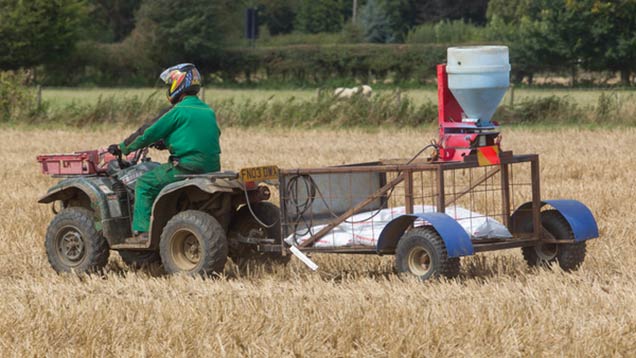Water company launches trial to tackle slug pesticide levels
 ©Tim Scrivener
©Tim Scrivener Farmers have teamed up with a water company for a new drive to cut slug pesticide levels in watercourses.
Launched by Anglian Water, the Slug it Out campaign aims to reduce the levels of metaldehyde slug pellets in rivers and reservoirs.
It urges farmers to consider alternative chemistry to metaldehyde, which is particularly difficult to remove from water, such as ferric phosphate slug pellets.
See also: Multi-agency scheme to save metaldehyde slug pellets
Slugs are one of the most devastating pests faced by UK farmers – without effective control large amounts of wheat and oilseed rape would be severely damaged.
However, farmers are coming under increasing pressure to meet tough EU targets amid reports that levels of metaldehyde have been recorded at 100 times over limits in the UK.
Even tiny amounts of metaldehyde in our waters will break European rules and in the long term it could mean new regulation being forced on farmers, and the UK receiving large fines from Europe.
The regulatory minimum level of metaldehyde stipulated by the European Union’s Water Framework Directive is 0.1ppb in treated water. This is the same as one drop in an Olympic-sized swimming pool.
However, levels in reservoirs in the Anglian region regularly exceed this and removing it is not currently possible.
As part of the campaign, Anglian Water is carrying out a trial project around six key reservoirs.
Farmers eligible to take part in the trial have land within the natural catchments of six reservoirs – Alton Water in Suffolk, Ardleigh Reservoir near Colchester, Hollowell Reservoir, Ravensthorpe Reservoir and Pitsford Water in Northamptonshire and Grafham Water in Cambridgeshire.
The company’s new team of five catchment advisers will be talking to farmers and agronomists about all the ways they can help reduce the amount of metaldehyde, which finds its way into rivers and reservoirs.
The farmers will receive payments to cover their costs of switching from metaldehyde and for taking part.
Lucinda Gilfoyle, who is heading the campaign, said: “Our aim is to work in partnership with the farming community to improve the region’s water quality.
“Anglian Water spends large amounts of money removing pesticides from drinking water – this raises customers’ bills and wastes energy.
“However the one pesticide we cannot remove is metaldehyde. This is why we are embarking on a proactive, responsible catchment management approach, which will benefit customers, farmers and our environment.”

